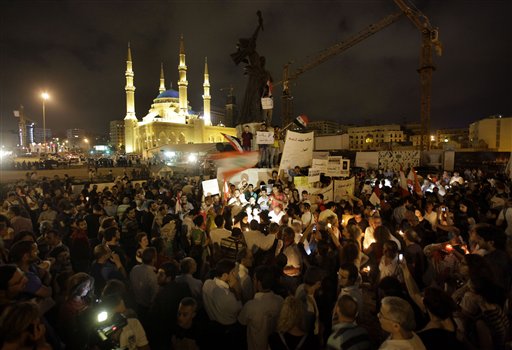The Syrian army launched raids on restive areas Tuesday, defying growing international reproach over the regime’s deadly crackdown on a 5-month-old uprising as Turkey’s foreign minister met with President Bashar Assad to express his concern.
Envoys from India, Brazil and South Africa also headed to Damascus to press for an end to the bloodshed, which activists say has killed about 1,700 people since March.
The visit by Turkish Foreign Minister Ahmet Davutoglu is significant because Turkey until recently had close ties to Damascus. But Ankara has become increasingly critical of its neighbor over the bloodshed. Turkey’s state-run news agency confirmed that Assad met Davutoglu.
Activists said tanks stormed villages outside the besieged city of Hama and two towns in Idlib province, which borders Turkey. There was heavy machine-gun fire in the eastern city of Deir el-Zour, which also has been a flashpoint in recent days.
The reports were confirmed by the Local Coordination Committees, which help organize and document the protests, and the London-based Syrian Observatory for Human Right. Both groups said at least two people were killed.
Syria has blocked nearly all outside witnesses to the carnage by banning foreign media and restricting local coverage that strays from the party line that the regime is fighting thugs and religious extremists who are acting out a foreign conspiracy.
In Washington, State Department spokesman Mark Toner lauded the visit and said Secretary of State Hillary Rodham Clinton had spoken to Davutoglu.
“They did talk about the situation in Syria, you know, and we believe it’s another opportunity to send yet another strong message to Assad that this crackdown on peaceful protesters cannot stand,” Toner said Monday.
India’s U.N. Ambassador Hardeep Singh Puri said his country’s representative is scheduled to arrive in Damascus on Tuesday and will join representatives from Brazil and South Africa for a meeting with Syria’s foreign minister to appeal for an end to the crackdown and to promote democratic reforms.
The Syrian regime has shown no signs of scaling back its crackdown despite Damascus’ increasing diplomatic isolation. Saudi Arabia, along with Bahrain and Kuwait in the Gulf, recalled their ambassadors this week.
In an editorial published Tuesday, the Al Baath newspaper of Syria’s ruling Baath party said the regime was hopeful that Turkey and the Gulf Arab nations will “quickly correct their stands.”
The latest wave of bloodshed started a week ago, on the eve of the Muslim holy month of Ramadan, when tanks and snipers laid siege to Hama, which had largely freed itself from government control earlier this year.
Residents were left cowering in their homes, too terrified to peek through the windows. The city is haunted by memories of the regime’s tactics: In 1982, Assad’s father and predecessor, Hafez, ordered the military to quell a rebellion by Syrian members of the conservative Muslim Brotherhood movement there, sealing off the city in an assault that killed between 10,000 and 25,000 people.
Since the start of Ramadan, more than 300 people have been killed in cities including Hama and Deir el-Zour, an oil-rich but largely impoverished region known for its well-armed clans and tribes whose ties extend across eastern Syria and into Iraq.
On Monday, Assad replaced his defense minister with the army chief of staff, saying Gen. Ali Habib was being removed from his post because of health problems.
But some analysts said the general was unhappy with the crackdown.


